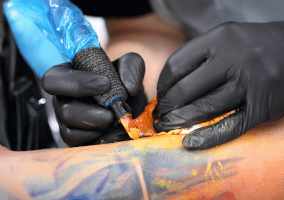Introductory Paragraph:
Are you interested in pursuing a career as a tattoo artist in Massachusetts? Becoming a tattoo artist can be a rewarding and fulfilling career for those passionate about the art of tattooing. In this blog post, we will explore the steps to becoming a tattoo artist in Massachusetts, providing you with valuable insight and information to help you on your journey in the tattoo industry.
Overview:
Becoming a tattoo artist in Massachusetts requires dedication, training, and a love for the craft of tattooing. Before embarking on this career path, it’s important to understand the steps involved in becoming a tattoo artist and what it takes to succeed in the industry.
Step-by-Step Explanation:
1. Apprenticeship: In Massachusetts, the most common path to becoming a tattoo artist is through an apprenticeship. This involves working under an experienced tattoo artist to learn the ins and outs of the trade.
2. Licensing: To legally practice as a tattoo artist in Massachusetts, you must obtain a tattoo license from the Department of Public Health. This involves completing a Bloodborne Pathogens Training course and meeting other requirements set forth by the state.
3. Building a Portfolio: As you work on your craft, it’s essential to build a strong portfolio showcasing your skills and creativity. This will help you attract clients and establish yourself as a reputable tattoo artist.
4. Networking: Building relationships within the tattoo community is crucial for success as a tattoo artist. Attend tattoo conventions, connect with other artists, and seek out opportunities to showcase your work.
5. Continuing Education: The tattoo industry is constantly evolving, so it’s important to stay up-to-date on the latest trends, techniques, and safety protocols. Attend workshops, seminars, and classes to enhance your skills and knowledge.
Practical Tips:
– Practice, practice, practice: The more you tattoo, the better you will become. Dedicate time to honing your skills and experimenting with different styles.
– Invest in quality equipment: High-quality tattoo equipment is essential for producing professional results. Choose reputable brands and prioritize safety and hygiene.
– Stay inspired: Draw inspiration from a variety of sources, including art, nature, photography, and other tattoo artists. Keep an open mind and embrace creativity in your work.
Pros and Cons:
Pros:
– Creative freedom to express yourself through your art
– Opportunity to build a loyal client base and establish a successful career
– Potential for financial stability and job satisfaction
Cons:
– Competitive industry with high standards for skill and professionalism
– Long hours and physical demands of tattooing
– Risk of occupational hazards, such as needle sticks and exposure to bloodborne pathogens
Conclusion:
Becoming a tattoo artist in Massachusetts is a challenging yet rewarding journey for those passionate about the art of tattooing. By following the steps outlined in this blog post, you can set yourself on the path to becoming a successful tattoo artist. Remember to stay dedicated, continue learning, and never lose sight of your artistic vision.
FAQs:
Q: How long does it take to become a tattoo artist in Massachusetts?
A: The timeline for becoming a tattoo artist in Massachusetts varies depending on individual dedication and the requirements of the apprenticeship program. It can take several months to several years to complete training and obtain a tattoo license.
Q: What are the costs associated with becoming a tattoo artist in Massachusetts?
A: Costs for becoming a tattoo artist in Massachusetts may include apprenticeship fees, licensing fees, equipment purchases, and ongoing education expenses. It’s important to budget for these costs and invest in quality resources to support your career growth.











